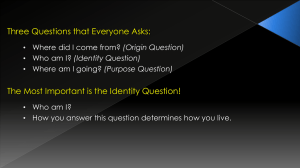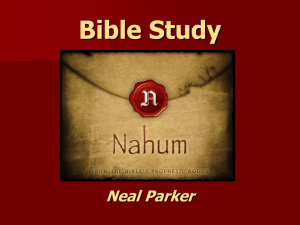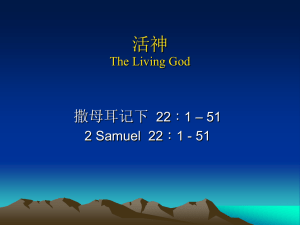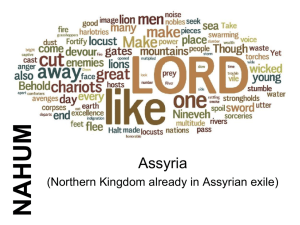- Scripture Unpacked
advertisement
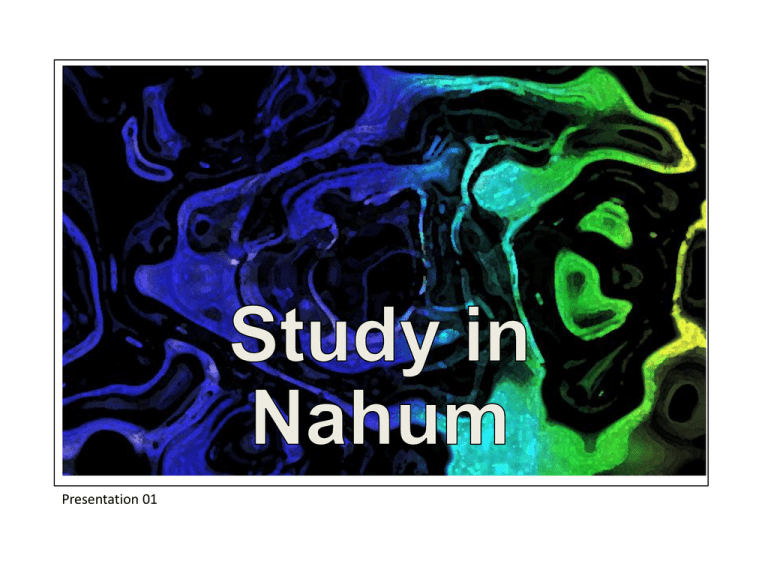
Presentation 01 Presentation 01 Introduction The book of Nahum, which describes the collapse of the Assyrian empire and her capital city, Nineveh, is often criticised as revealing little of the grace of God. The emphasis upon God’s wrath does little to deflect such criticism. However its importance only begins to emerge when we consider the circumstances surrounding the prophecy. Written some 50 years after Micah, Assyria is now no longer the rod of God used to chastise his wayward people [Mic.6v9], she is before his bar of justice, having overstepped her role in the cruel execution of her task. Cf. Isa.10v5-7. Nahum reveals God’s attitude towards cruel regimes who act as if they are answerable to no one. Presentation 01 Introduction Those who suffer under such oppression often query God’s character, “How can God allow these cruel powers to behave as they do?” Nahum addresses that question by showing that God is implacably opposed to evil. It has been said that the petition in the Lord’s prayer, “Thy kingdom come” is like a two edged sword. The establishment of righteousness of necessity involves the overthrow of evil. Cf Rev 22v14-15 and 2 Thess.1v6-10. The word ‘oracle' in v1 indicates that this is a message given by God, it is sometimes translated as 'burden', and often points to disaster and impending calamity [Isa. 13v1ff]. It is the sort of message that would be like a weight tied around the neck of those to whom it is addressed. Presentation 01 Introduction This oracle was written before the fall of Nineveh in 612 B.C. possibly around 635 B.C. Nahum's news of impending disaster for Nineveh would have been an almost unbelievable revelation to many to take in. Nineveh, was the centre of a vast empire, still seen at the height of its power. She was proud of her long history [Gen. 10]. Sennacherib [705-681 B.C.] spent most of his twenty-five year reign enlarging and strengthening the city. He called his residence there, a ‘palace without a rival’. A massive aqueduct brought water into it from the mountains to the east. A double rampart encircled the city for the protection of its approx. 300,000 inhabitants. Of all the cities of the ancient world only Babylon was larger. Presentation 01 Introduction It is towards this great city that a message of impending doom is addressed. Imagine how relieved its subject nations would be to hear this prophecy read. Judah had already lived through almost a century of Assyrian terror. The Assyrians revelled in the torture they employed to hold control over their subjects. The records they left behind, spanning 250 years, tell the same sad tale. The Assyrian empire has to be ranked with the concentration camps of Nazi Germany, there is ‘nothing new under the sun’ Eccles. 1v9. Greece Assyria is an example of what happens when lust for power is combined with callous indifference to human suffering. Nineveh Mediterranean Sea Egypt Presentation 01 Jerusalem Revelation of God’s Character Godless Manasseh, king of Judah, had led the people astray, [2Kings 21v9]. The godly remnant of Judah would not have been surprised that God had raised up Assyria to chasten their nation. But the cruelty of the oppressor would have taken their breath away. How could Assyria be stopped? Nahum’s response is addressed to faith. No matter how great the problem, faith refuses to view matters from a human perspective. Now Nahum does not advocate guerrilla warfare, or political intrigue. Instead, he points heavenward. In particular he focuses upon God’s special relationship with his people. The repetition of the covenant name, 'the Lord', emphasises this point. It occurs ten times in ch.1. God is the one who has to be taken into account in any final reckoning. Presentation 01 Revelation of God’s Character In contrast, the name of ‘Nineveh’ is not mentioned after 1v1 in ch. 1 at all, it occurs only in 2v8 and 3v7. Were it not for the title we would not initially be sure of the identity of the enemy referred to. In comparison with the Lord, Nineveh is a nonentity commanding little attention today. But the truths that Nahum unpacks about the Lord are still valid and needed today when evil governments continue to arise and pitilessly butcher and terrorise men. The eye of faith must see beyond the seemingly unassailable Ninevehs of this world to the Lord who has bound himself indissolubly to his people Presentation 01 Revelation of God’s Character The Lord is ‘jealous and avenging’ v2. He will deal decisively with all who try to disrupt the bond he has created between himself and his people. In what way can we describe God as ‘jealous’? Jealousy when associated with man is usually an evil trait born of unjustified suspicion and personal insecurity. But in essence it is ‘a vigilant commitment to maintain a relationship’. And so God 'jealousy' reflects the intensity of his love and of his determination to maintain the commitment between himself and his people. He will permit no rival for his people’s obedience and affections. Cf. Deut. 4v23-24. Presentation 01 Revelation of God’s Character The Lord is also described as an 'avenging God'. The Lord takes vengeance on his foes. Again that is easily misunderstood in terms of the blood feuds and petty malice that human squabbling often produces. This vengeance, in view here is not a private retaliation, but the assertion of God’s sovereign rights [Psalm 94:1]. It is not vindictiveness, but vindication of God’s sovereign Lordship. It is the exercise of due authority by one whose authority has been impugned Presentation 01 Revelation of God’s Character The Lord’s vengeance is the corollary of his jealousy, for it not only requires his people to be single-minded in their devotion to him, it also means that he will not permit any third party to disrupt the relationship between himself and his people [Deut. 32v41-43]. The Lord is filled with ‘wrath'. Wrath is a word of intense and passionate feeling. God is not lukewarm about anyone or anything that mars the relationship he has created. He has judicially determined to act against those who have pitted their puny might against him. It might appear that one act after another is perpetrated with impunity, but God is watching and he is waiting and when he is ready, he will act. Presentation 01 Revelation of God’s Character To those who say, ‘Why has God not already acted against Assyria?’ Nahum answers that ‘The Lord is slow to anger and great in power; the LORD will not leave the guilty unpunished’. v 3. God had previously set out his character in the wilderness to his covenant people; 'The Lord, the Lord, the compassionate and gracious God, slow to anger, abounding in love and faithfulness, maintaining love to thousands, and forgiving wickedness, rebellion, and sin Yet he does not leave the guilty unpunished; he punishes the children and their children for the sin of the fathers to the third and fourth generation'. Ex. 34v6-7. Presentation 01 Revelation of God’s Character God does not act with the swift response of human anger, but with the deliberateness of a merciful and gracious God. We need to remind ourselves that he had previously sent Jonah to preach repentance in Nineveh Jon.3v4-5. And their short-lived repentance had stayed his hand! Nahum also emphasises God's power by using graphic images, taken from God’s deliverance from Egypt at the Red Sea and deliverance into the land of promise at the Jordan. His point is that if God can act in this way in the natural realm, he can also act against the empires and united forces of man? Presentation 01 Revelation of God’s Character God’s way is in the whirlwind and the storm, which represent the suddenness of God's action [Ps. 18v7-15; Isa. 66v15; 1 Thess. 5v3] and the devastating effect of his power. Clouds are the dust of his feet. Clouds are often associated with the coming of deity to emphasise heavenly grandeur [Ps.104v3; Rev. 1v7). But here the picture is developed from an army hurrying to battle, and kicking up dust with their boots. When God comes to act, so great is the power of his presence that clouds are what he stirs up. Presentation 01 Revelation of God’s Character The command of the Creator is sufficient to change the order of nature. He rebukes the sea and dries it up; he makes all the rivers run dry v4. He is the one whose mere rebuke [Isa. 50v2] dries up the sea, which was viewed in the Ancient World as a hostile deity. And if the glory of nature shrivels up before the Lord how much more the pride of man? Bashan and Cannel were not the sort of places liable to be affected by drought, but the LORD can reverse their condition. If that is so, who then can resist him? Who is not vulnerable? Presentation 01 Revelation of God’s Character The mountains quake before him and the hills melt away v5, intensifies the argument. The Lord is the one who causes earthquakes and volcanic eruptions [Ps. 97v5]. What seemed most stable - the mountains - quake at him [Isa. 64v1]. The Lord is in control of nature, and the forces of nature which cause terror and devastation among the inhabitants of the world. The conclusion is drawn by means of two rhetorical questions. ‘Who can withstand his indignation? Who can endure his fierce anger?’ v6. The answer is clearly implied; it is not possible for anyone to stand [Ps. 76v7; 130v3; Mal. 3v2]. His wrath is poured out like fire; the rocks are shattered before him. That is the awesome reality that all those who are his enemies, have to reckon with. Presentation 01 Revelation of God’s Character Scripture consistently asserts that God will judge sin. The gospel message is twofold: there is the proclamation of pardon and acceptance that is achieved through faith in him and his provision in Christ; and there is also the proclamation that his wrath ‘against all the ungodlessness and wickedness of men' [Rom. 1v17,18]. To minimise the reality of God's righteous wrath against sin is to debase his holiness, to demean the significance of the cross, and to leave in frightful peril those who do not recognise how their sin has offended God. Nahum's message here is an essential part of God’s self-revelation. Presentation 01 Revelation of God’s Character It is also the case that it is from the confession of God as Creator and Sustainer of the universe that Nahum argues to the impending judgment against the nations that make light of his requirements. They take the field against God at their cost and well deserved ridicule [Ps.2]. Nations are without excuse because the ‘eternal power and divine nature of God has been made plain to them’ [Rom. 1v18-20]. Presentation 01 Template Text here Presentation 01


